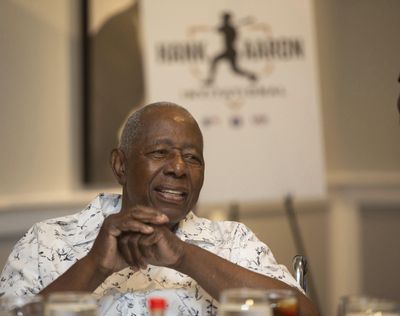Hank Aaron still fighting for more diversity in baseball

ATLANTA – When Brian Hunter and other former major league players were in the presence of Hank Aaron, they acted like teenagers, standing, pointing and trying to get pictures when he entered the room.
Someone whispered, “there he is.”
The vibe in the room quickly changed upon Aaron’s arrival at an Atlanta restaurant Friday to talk with 44 high school players, mostly African-Americans. The visit was part of Aaron’s ongoing efforts for more diversity in baseball.
Hunter, who has been coaching some of the players, said that the 85-year-old Hall of Famer has that effect on baseball players of all ages. The high school players in attendance had a similar impact on Aaron.
“It fills my heart, really makes me feel very proud,” Aaron said.
The players were selected to participate in the inaugural Hank Aaron Invitational exhibition game at SunTrust Park on Saturday. The event, formerly called the Elite Development Invitational, was renamed for Aaron last year.
Aaron has lobbied for efforts to encourage more young black athletes to choose baseball and he supports this diversity initiative by Major League Baseball.
On Friday, the players were taken on a civil rights tour of Atlanta that included the home of Dr. Martin Luther King Jr., the King Center and King’s former church, Ebenezer Baptist. Former Atlanta mayor Andrew Young, 87, joined Aaron for a question-and-answer session with the teens.
The high school sophomores, juniors and seniors were coached by Hunter, the former first baseman with the Atlanta Braves and other teams, and other former players, including Marquis Grissom, Tom Gordon, Marvin Freeman, Michael Tucker, Jerry Royster and Ty Waller, in Vero Beach, Florida. The top 44 – Aaron’s uniform number – were selected from a field of 250 players ages 13 to 18.
The program is designed to encourage teens from diverse backgrounds to remain in the game.
Hunter quickly confirmed “I’m a fan” of Aaron “and all our guys.”
Aaron answered questions about the pressures of being a black player when he began his career in 1954 and how he dealt with racism.
Sitting in a wheelchair, Aaron told the teens about his childhood in Mobile, Alabama. He said he was told by his mother to crawl under his bed to avoid the Ku Klux Klan outside his home.
He also talked about the final days of his home run chase in 1974, when teammates were afraid to sit too close to him in the dugout due to threats that he would be shot before breaking Babe Ruth’s career record.
“The last four or five days were probably the toughest days of my baseball career,” Aaron said, adding he took comfort from having his mother and father alive to see him break the record and having his wife, Billye, by his side.
“After it was over with, my wife and I … prayed and thanked the Lord for blessing me with that moment,” he said.
Royster was in the Dodgers’ dugout when Aaron hit his record-breaking 715th homer on April 8, 1974. Royster said he was so happy, even though the homer at old Atlanta-Fulton County Stadium was against his team, “I jumped up so high I hit my head on the top of the dugout.”
Aaron finished his career with 755 homers. The record was broken in 2007 by Barry Bonds, who finished with 762 but has failed to land enough votes to enter the Hall of Fame due to allegations he used performance-enhancing drugs.
Aaron said “the saddest part” of his career was never winning the Triple Crown, always falling short of leading the National League in homers, RBIs or batting average.
“I wanted to do that so bad,” Aaron said, turning to Young and adding “Andy, I still dream about it right now.”